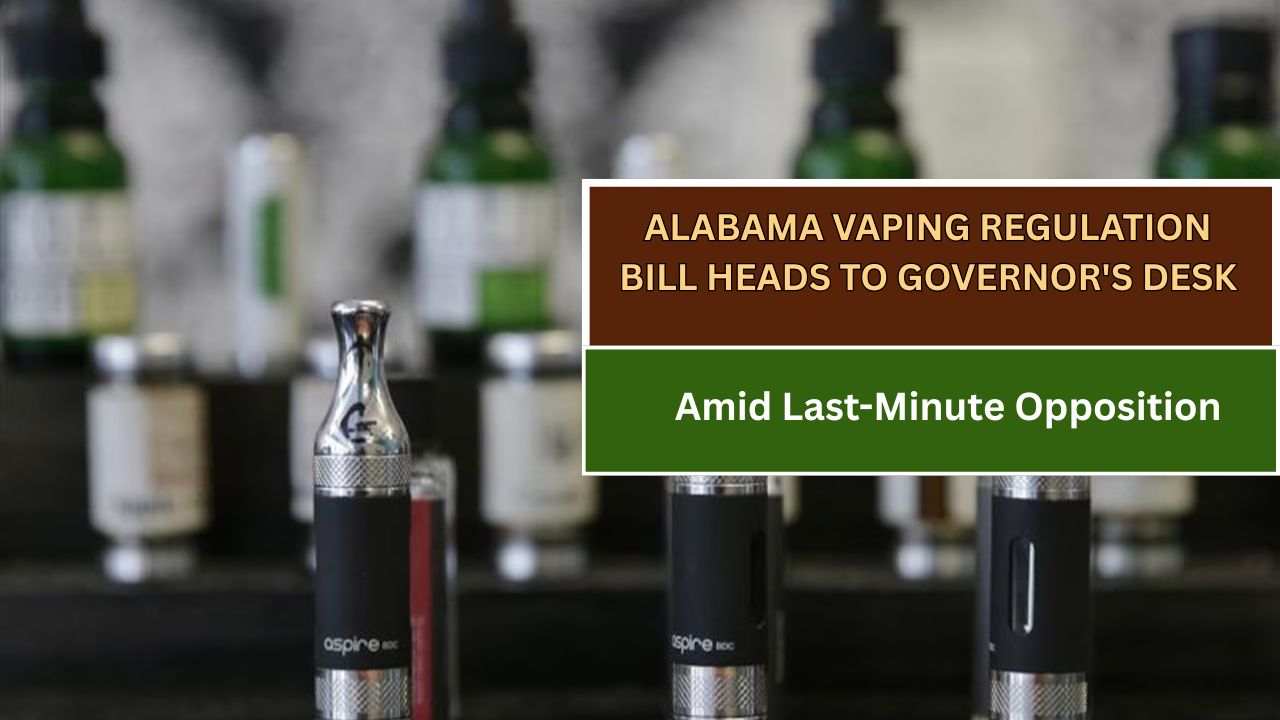After years of debate, Alabama lawmakers have passed a landmark bill to regulate e-cigarettes and vaping devices, sending HB8 to Governor Kay Ivey for final approval. The bill, championed by Rep. Barbara Drummond (D-Mobile), marks a significant step in the state’s efforts to address the rise in youth vaping.
“This is a game-changer for Alabama,” Drummond said. “I think HB8 will save some children’s lives.”
The legislation arrives at a critical moment. According to public health data, 17.5% of Alabama high school students report using vaping products—more than double the national average of 7.8%.
Vape Industry Pushback Over Flavor Restrictions
The bill’s most controversial provision was introduced by Sen. Bobby Singleton (D-Greensboro) through a narrowly approved amendment. The change would restrict convenience stores to selling only 34 FDA-approved tobacco and menthol-flavored vape products, banning hundreds of flavored items pending FDA review. These other flavors could only be sold at age-restricted specialty vape shops.
“Alabama is looking at being the only state where retail convenience stores are limited to FDA-approved products,” said J. Bart Fletcher, president of the Petroleum & Convenience Marketers of Alabama.
“This threatens small businesses and could deter major chains like Wawa and Circle K from expanding here.”
Fletcher said vape products generate an average of $6,117 in monthly revenue per store and make up 30% of convenience store sales, with nearly 30% gross margins.
Governor Ivey’s Decision Pending
HB8 is now on Gov. Ivey’s desk, where it is drawing intense lobbying from both supporters and opponents. A spokesperson for the governor said only that the bill is “under review.”
Sen. Singleton has requested an executive amendment that would allow the sale of more than just FDA-approved products at convenience stores. He emphasized the need to balance youth protection with small business survival.
“We need to rein it in,” Singleton said, “but I don’t want to see small businesses go out of business.”
However, Sen. David Sessions (R-Mobile), the Senate sponsor of HB8, urged the governor to sign the bill as passed, calling Singleton’s proposal “unfriendly.”
“If the governor is serious about protecting Alabama family values, she’ll sign the bill,” Sessions said.
Sessions grew emotional during the final Senate debate, stressing the urgency of addressing youth access to vape products.
“You won’t stop every child from vaping,” he said, “but at least we’ll remove so many choices that are in their faces.”
He also issued a warning: “If the bill comes back, I’m taking it all out of convenience stores. They can fill the space with something else.”
Key Provisions of HB8
The bill includes several provisions focused on public health and youth prevention:
- Ban on vending machine sales of vape products
- Increased penalties for selling to anyone under 21
- Requirement that vape products be manufactured in the U.S.
- Creation of a statewide vaping education program in schools, under the Alabama State Board of Education
Virginia Guy, executive director of the Drug Education Council in Mobile, praised the bill’s educational aspect.
“We have third and fourth graders who vape daily,” Guy said. “The industry sold these products as safer—not safe. And now we see they are not safe at all.”
Critics Warn of “Big Tobacco” Influence
Opponents argue the bill favors large corporations and undercuts small vape businesses. Jim McCarthy, spokesperson for the American Vapor Manufacturers Association, condemned HB8 as a windfall for major tobacco companies.
“It punishes entrepreneurs and consumers while giving market control to the same cigarette giants who profited from harm for decades,” he said.
Previously, public health organizations such as the American Cancer Society, Lung Association, and Heart Association had also opposed similar bills, fearing they might inadvertently drive people back to smoking.
“We support fact-based policies like increasing taxes, funding control programs, and creating smoke-free environments,” said Jane Adams, government relations director for the ACS Cancer Action Network.
She also noted that the closure of the CDC’s Office on Smoking and Health in April leaves states with fewer resources for tobacco prevention.
Drummond’s Personal Mission and Political Future
For Rep. Drummond, HB8 represents more than just legislation—it’s a personal mission that began years ago in a Sunday school classroom, where she mistakenly thought a student was using a USB drive. It turned out to be a vape.
“I knew I had to do something,” she said. “This was about saving lives.”
Drummond, who is running for Mobile mayor in the August 26 election, says the timing of the bill’s passage and her campaign is coincidental.
“I’m a legislator. Policy is what I do,” she said.
Still, the legislative victory has elevated her profile. During a recent Mobile mayoral forum at Cottage Hill Baptist Church, Drummond’s pre-recorded message was played before and after the live candidate panel.
Rep. Sam Jones (D-Mobile), former mayor from 2005 to 2013, praised her dedication—despite voting against the bill over concerns for small businesses.
“I know Barbara,” he said. “She’s one of the hardest-working people I’ve ever met.”
This article has been carefully fact-checked by our editorial team to ensure accuracy and eliminate any misleading information. We are committed to maintaining the highest standards of integrity in our content.

Outside of work, he enjoys playing chess, following cricket, and writing short stories. His commitment to integrity and in-depth analysis strengthens OTE News’ mission of providing trustworthy journalism.



